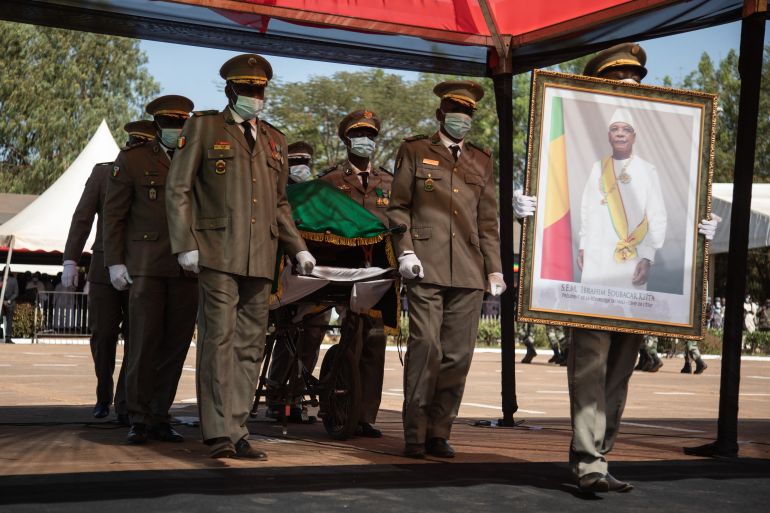Mali holds state ceremony for ex-President Ibrahim Boubacar Keita
Keita died aged 76 and was due to be buried at his residence in the capital, Bamako.

Mali has held a state ceremony for former President Ibrahim Boubacar Keita, who was removed in a 2020 coup and died last week.
Interim Prime Minister Choguel Kokalla Maiga attended the ceremony on Friday at a military camp in the Sahel state’s capital, Bamako, where the former leader’s coffin was draped in the Malian flag.
Recommended Stories
list of 3 items- list 1 of 3Former Mali President Ibrahim Boubacar Keita dies aged 76
- list 2 of 3Can democracy return to Mali?
- list 3 of 3West African leaders to discuss Mali’s political crisis
Keita’s relatives also attended the ceremony. Former Malian Prime Minister Moussa Mara, Guinea’s foreign minister, and foreign diplomats in Bamako were also present.
Thousands of people gathered at the former president’s residence in Bamako to pay their respects.
Keita, who was elected in a landslide in 2013 and won re-election five years later, died aged 76 on Sunday. He was due to be buried at his Bamako residence later on Friday.

Mali’s brutal conflict overshadowed Keita’s presidency, which along with a flagging economy and perceived government corruption, contributed to mass protests against him in 2020.
Young army officers led by Colonel Assimi Goita forced him out of office on August 18, 2020, detaining Keita and other leaders.
Under pressure from the Economic Community of West African States (ECOWAS), the military group that emerged from the rebellion released Keita on August 27 the same year and sent to his residence in Bamako, under surveillance.
He suffered a mini-stroke the following month, and was sent to the United Arab Emirates for treatment.
The military went on to stage another coup in May 2021.
ECOWAS in December agreed to sanction Mali after the military rulers proposed staying in power for up to five years before staging elections – despite international demands to respect a promise to hold the vote in February.
Goita, the head of the military government, has declared a three-day national holiday in Keita’s honour, starting from Friday.
Al Jazeera’s Nicolas Haque, reporting from Dakar, said Keita was a divisive figure.
“Before his toppling, there were tens of thousands of people in the streets asking for his resignation, he has been accused of corruption … and his legacy will be questioned given the situation in which Mali is currently,” Haque said.
Mali has struggled to regain stability since 2012, when ethnic Tuareg rebels and loosely aligned armed groups seized the northern two-thirds of the country, leading former colonial power France to intervene to temporarily beat them back.
Ethnic killings and armed forces’ abuses had become a defining feature of Keita’s presidency, despite thousands of French and international troops deployed to contain the armed groups.